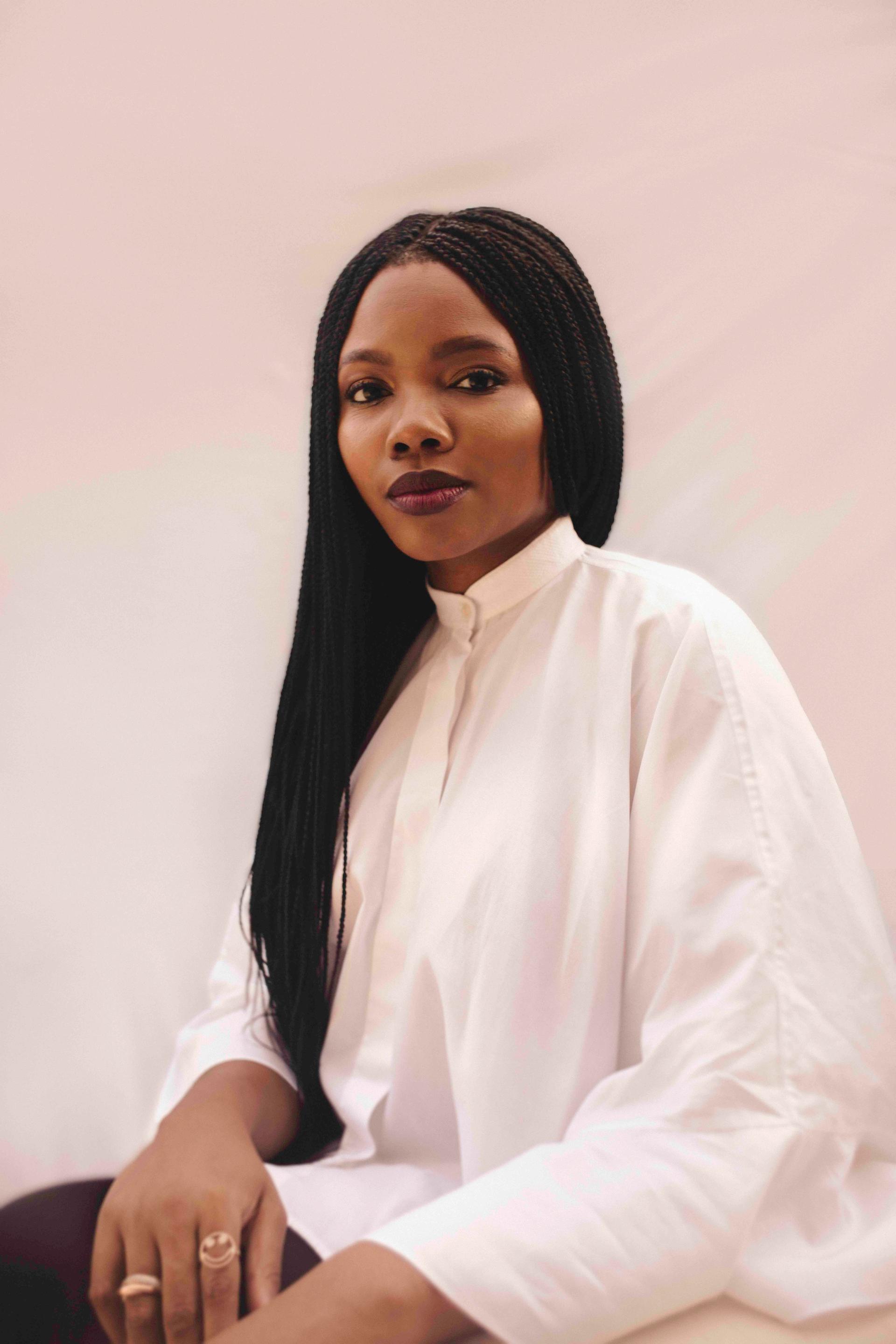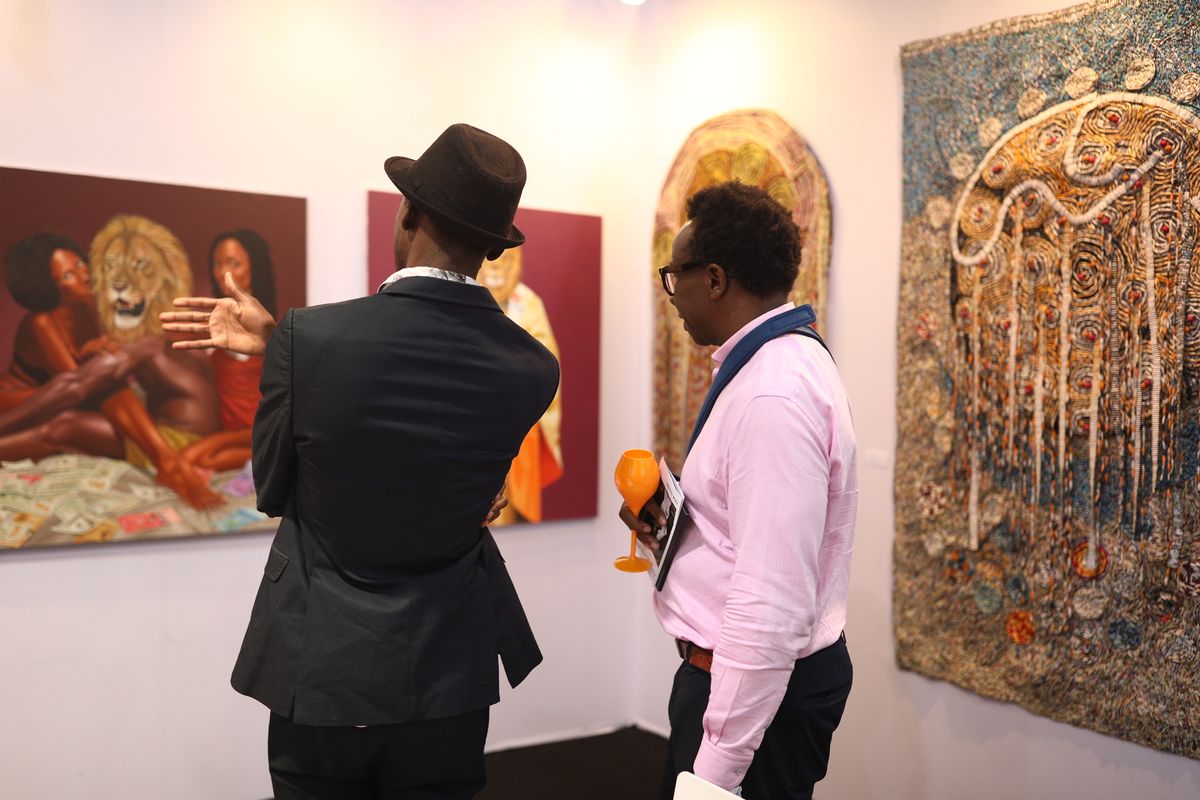Addressing hundreds of sweat-drenched party-goers on Friday night, Tokini Peterside, the founder of the Art X Lagos fair, announced that Nigerian art would no longer be defined by outsiders. Peterside promised that the artists exhibited at the fair would show the world “what it really means to be an individual, to stand out, to have no fear, to not conform, to play the game the way we want to play.”
In 2016 Peterside shook up the Nigerian art scene with the launch of Art X Lagos, the country’s first major international art fair. The fourth edition of the fair, which opened on Friday at a new venue in the heavily-fortified grounds of Lagos’s Federal Palace Hotel on Victoria Island, was more than double the size of the first at 22 galleries (though that is still small by international art fair standards).
This year over 93 artists from more than 24 countries were exhibited, but with a sustained focus on those from Nigeria, the surrounding region and the West African diaspora. “By expanding the number of collectors, I want to create an infrastructure for artists to work,” Peterside says.
The daughter of a Lagos banking entrepreneur and a psychologist, Peterside, now 34, studied law at the London School of Economics and started collecting African art at the age of 23 after returning home to Lagos in 2008. She recalls a “quiet art scene” dominated by “a small group of collectors”.
The stasis in collecting circles directly impacted on Lagos artists’ ability to have their work seen, or to benefit from opportunities like mentorship schemes, grants or residencies, Peterside says: “There is a mass of talent in Nigeria, and there has been for a long time. I was concerned, if the demand pool remained so small, with very little attempts to grow it, what it would mean for the sustainability of the market.”
The fair’s opening ceremony was awash with the Lagos elite, including the garlanded presence of Nigeria’s Vice President, Yemi Osinbajo. On the following evening, a decidedly younger and more raucous crowd of Lagos ingénues arrived to dance to Art X Live, a series of visual performances headlined by local celebrity and electro-fusion artist WurlD.

Tokini Peterside © Lakin Ogunbanwo
Art X Lagos has coincided with a spike in interest in African art from European institutions; delegates from the Smithsonian, Centre Pompidou and Tate Modern, including Osei Bonsu, the recently-named international art curator for the African arm of Tate Modern, were present at the fair. Yet Peterside says that attracting international attention, whilst welcome, is not the fair’s primary focus. “We have a laser focus in pursuing our own mandate, which we have designed with our communities in mind,” she says. “When I launched this, I didn’t do it because I wanted thousands of international collectors to fly in and buy African art. No. My first area of focus was converting affluent Nigerians, and ensuring they become supporters and patrons of the city’s artists.”
The art on show is noticeably figurative rather than conceptual, and with a distinct focus on portraiture. In a young nation, and in the context of a poverty-stricken city further disrupted by vertiginous development, some curators posit this focus could in part be understood by an attempt to explore, define and assert identity issues. “In Nigerian culture, art has traditionally been an object of beautification,” Peterside says. “We’ve still held on to that. We’re still not willing to embrace what’s happening in Europe, which is that art moves beyond the aesthetic and goes purely to the conceptual. Collectors here want work that, after a long day grinding through the Lagos traffic, gives them pleasure.”
Many of the works here are indeed beautiful, such as the work of Jems Koko Bi and Kassou Seydou from Côte d’Ivoire’s Galerie Cécile Fakhoury, and the more abstracted work of Ablade Glover, shown at Accra’s Gallery 1957. Yet the fair is also notable for the inclusion of Peju Alatise’s conceptual sculpture The Other Side of the Coin, Born Not to Suffer. Kavita Chellaram, the founder of Lagos gallery and auction house Arthouse Contemporary, describes Alatise as “the leading female artist in the country.” For a city home to many hugely wealthy individuals—including four billionaires—but also children who must beg for food at car windows, Alatise’s work acts as a challenge “to the one per cent who live in a bubble and don’t realise how difficult life is,” Chellaram says.
Also of note was the work of the self-taught documentary photographer Etinosa Yvonne, from Benin City, Nigeria, who was awarded the 2019 Access Bank ART X Prize, and will now spend the next year developing her montage portraits of survivors of Nigerian terrorism. “A series that is very personal to me,” Yvonne says, the work explores the hidden experiences of post-traumatic stress disorder on a wide-range of Nigerian citizens. The results of Yvonne’s residency will be exhibited at Art X Lagos 2021, the next step in the life-cycle of a fair that seems set to continue to revolutionise the West African art market.


